Above: Class head catching is a culture unique to the Kiwit Village, in which kaka of the upper class will select a suitable safa as the class head. The work of a class head may be hard but young men in the village never try to run, instead, courageously assume the major responsibility of cultural inheritance.
The age class promotion ceremony takes place once every 3 years in Kiwit Village, youths that are about to be promoted from class 1 to class 2 put on a black skirt and eagle feather headdress, and circle the village to announce the news that they are about to be promoted. After 3 years of training, the boys are all strong in physique, their childish faces coupled with resolution in their eyes, eyes that sparkle with flame.
Elders who are 70 years of age, solemnly pass on their sla (class) name to the new blood in the village. The youths thus have a name for their class, buddies that are promoted together will be their siblings for life, for better or for worse. The name they inherited from the older generation will follow them for life until their hair is grey, when they will again pass on their sla name to the next generation.
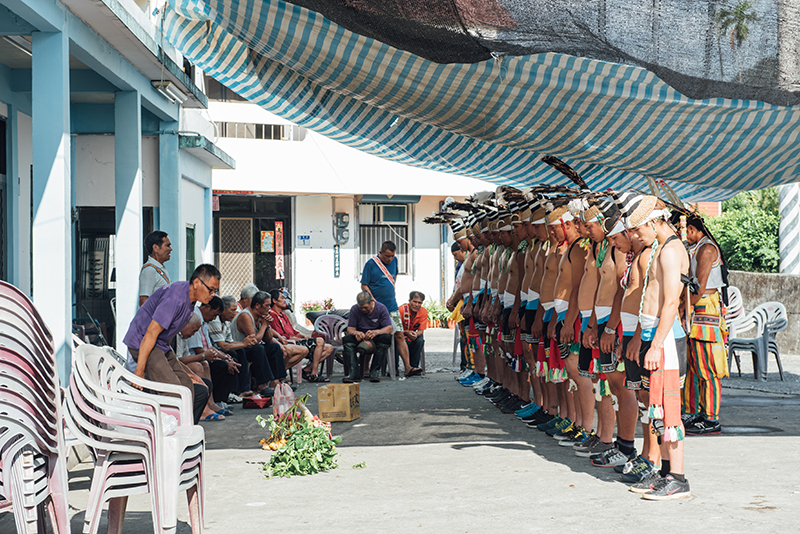
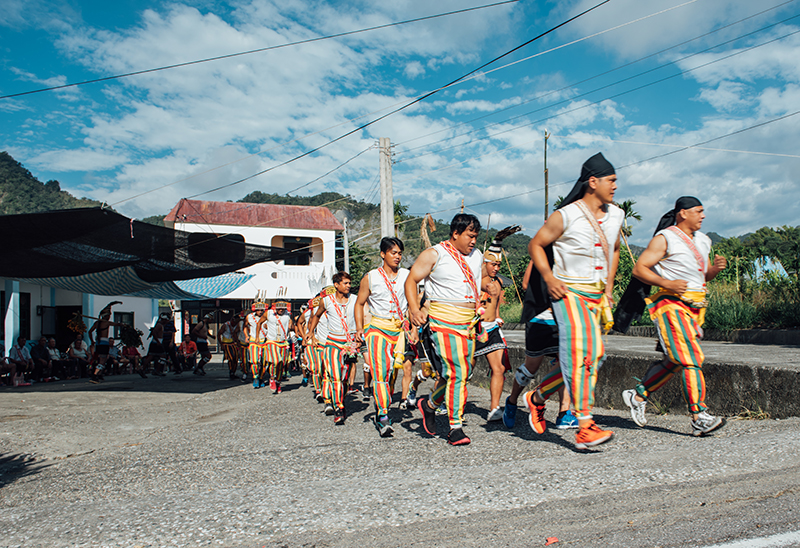
The Pangcah people of Kiwit Village wearing eagle feather headdress, hunting knife on the back and bells tied to the thigh. Reporting news along the streets of the village in an orderly fashion, they are notifying neighboring villages of the upcoming ceremony.
An Age Class System
with Distinct Responsibilities and Power
The Kiwit Village sits between the Coastal Mountain Range and Xsiuguluan River, its geographical location safe and discreet, which helps to maintain to date the entire culture of rituals and ceremonies, age class system, and the system of talo’an.
In the past, there are often hostile confrontations between indigenous villages, so the male is an important armed force to fight off the enemy. Boys in the village join the age class at 14 to 16 and live in talo’an with unmarried adult male to receive physical and knowledge training. The system divides three years into a class, categorized as youth (class 1 to 4), young adult (class 5 to 9) and mature (class 10 to 15), 15 classes in 3 stages. Every stage and class have distinct responsibilities and power, much like military management, and each in charge of different tasks and missions. The younger male (safa) in lower classes must obey the orders of the older male (kaka) in upper classes, the upper classes will also respect the decisions made by the lower ruling class, thus forming a well-connected relationship between the classes.
“When the boys are of age, we catch them and put them in here, the little ones sometimes hide from us.” Currently class 15 and the class leader of Lakowal (Pangcah language for turtledove), Chiang Kuo-Hsiung laughed and said that elders used to intimidate the kids, “life is going to be tough in the age class, the older ones are horrible and they will whip you good!” But for boys in Kiwit Village, they grew up awed by the older boys in age class, although a bit afraid, they look forward to one day joining the age class and grow into an independent man as well.
“Back in my days, boys in class 1 to 4 help out at home during the day and sleep in the talo’an at night. In addition to safeguarding the village, they keep each other company and have a good time.” But more and more people have left for school or work, the boys no longer live together and only gather during holidays and important rituals.
Class 2 boys are in their prime fitness age of 17 to 19 and are the main muscle behind all village affairs, in charge of preparation for all rituals and labor. It is the toughest class. They are also preparing to move into class three, the leading class, and must accept the rigorous training provided by the upper class in leadership and wisdom.
Young adults in class 3 have a “class head” selected to lead the entire class in execution of their tasks. Members of class 3 will catch a class head from the class 2 members ready to be promoted to become the leader of the new class, and the class head is responsible for life until their old age, when they leave the age class.
Class 3 spends 24 hours a day with class 1 and 2 members, they are most familiar with the capability and character of their lower classes, therefore, kaka in class 3 will secretly select the candidate for class head before the Harvest Ritual, along with their second and third choices to assist the future class head. After a candidate is chosen, they will notify class 4 of their choices, “if class 4 thinks otherwise but class 3 insists, they will respect the decision of class 3. It’s because they are most familiar with the capabilities of these younger ones, the class head and assistants they choose are to play important roles in leader future village affairs, if their chosen ones don’t do well later on, that means they didn’t do a good enough job teaching your safa, and they must take responsibility as well,” so explains Chiang Kuo-Hsiung.
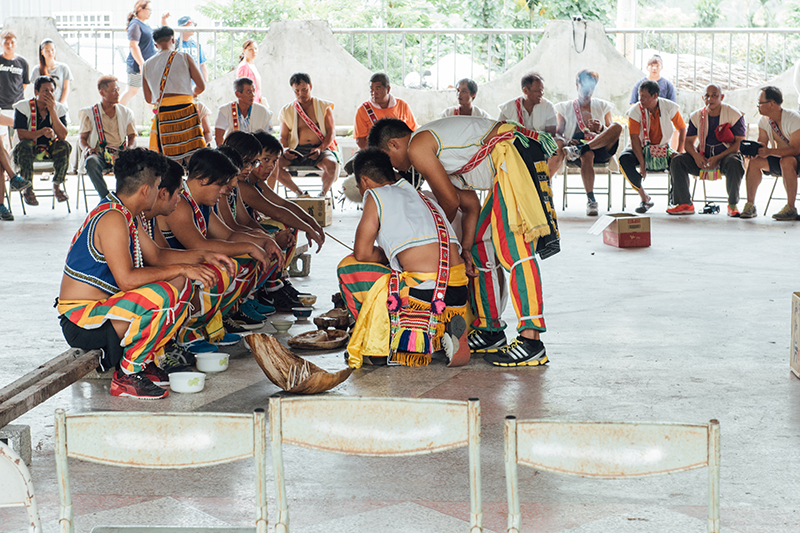
Third day of the Annual Ritual is when evaluation takes place. The older ones will carve meat and serve to the younger ones to show their appreciation of the effort put in.。
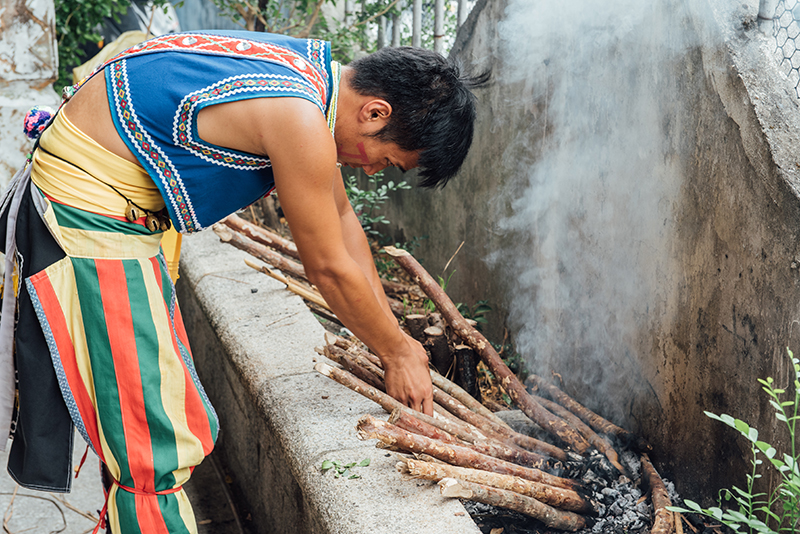
Whenever a senior pick up a cigarette at the Annual Ritual, the younger ones must rush over to light it for the senior. The people do not use a lighter but take this opportunity to train the response and concentration of the young ones.
Devoted to the Village
with Full Support from the Family
The history of class head catching cannot be traced to its origin, but as far as Chiang Kuo-Hsiung could remember, the class head catching custom has never stopped. He still remembers the day he received notification that he was to become the class head. He was still in military service then and his uncle attended the Harvest Ritual on his behalf, his uncle was dancing when he was caught to be the class head, “my uncle was already a bit aged then and couldn’t out run the younger ones, so he was caught and put on the headband signifying his position as class head.”
He still recalls that rather mixed feeling when he received the phone call. On the one hand he was happy to be recognized as capable by his kaka, but on the other he was worried, “do I really have what it takes to lead my class?”
The class head has great responsibility, not only does he have to be strong in physique to lead as example in his class, he needs to have the wisdom and vision to lead. Chiang Kuo-Hsiung shared with us an example. A month before the Fishing Ritual, class 1 to 4 spend their nights chopping timber and collecting tuba, the survey of topology beforehand, estimation of the number of tuba, and distribution of work to be executed all rely on the instruction and deployment of class 4 head, “you need a clear mind to be class head, think thoroughly before making leadership judgments and plan B, otherwise if something goes wrong at the Fishing Ritual, you won’t hear the end of it from the elders!”
The higher you are promoted in class, the heavier the duty of class heads. You have to lead the entire class in the execution of tasks from upper classes and make sure you lead the lower classes properly. “On the third day of Harvest Ritual, there is a ceremony to show appreciation to lower classes, the class head must prepare pork and alcohol to thank the lower class.” Chiang Kuo-Hsiung shared that in the past people were not very well off, these food are all expensive resources and required help from the entire family, for example, a family elder would hunt boars in the mountain, and during the prohibition, they would secretly brew rice wine in the middle of the night, all to help the class head get the resources required ready.
Because class head has to work very hard and must tend to village affairs at all times, it is very hard to find a permanent job outside, and most of them end up staying in the village as temporary construction worker or laborer. So, whenever it is time to catch class head, some parents do not want their child to become the class head and will chase the upper class away or resist the catching. “It really is hard work being a class head, it’s not just about you, the whole family will be involved,” explains Chiang Kuo-Hsiung.
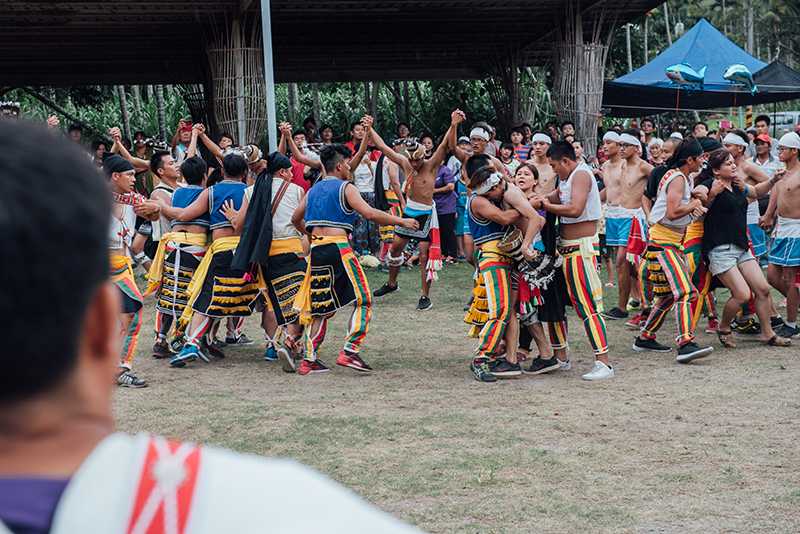
Fig 3: When parents see their child caught, they will try to stop the process because they do not want such responsibility for their child, a fight which also represents the humility of the family, as in they do not consider their child better capable than others.
Stick It Out
However Difficult It is
Chiang Kuo-Hsiung has been a class head for 37 years and now promoted to class 15, the commanding class in the age class system. In another two years he will be promoted to the lowest kalas (elder) class and relieve himself of the class head burden he carried for almost 40 years. “Outsiders say that you have to be a class head for 42 years, but it’s actually 39 since we don’t have class heads in class 1 and 2,” he smiled.
Chiang Kuo-Hsiung is also secretly worried about cultural inheritance. In response to the civilization, development, employment, and economy of modern society, it is very difficult for indigenous villages to be enclosed like they used to, once the inheritance is interrupted, it will be very hard to recover the culture. Due to the dwindling birth rate in Kiwit Village, there are not enough manpower to help prepare for festivals, some proposed to stop holding the Fishing Festival and hoped that Chiang Kuo-Hsiung, the class 15 commander, could make that decision. Chiang Kuo-Hsiung sighed, “if I really were to make the decision to terminate it, I will be condemned forever.” He was dead set against it but also said, “we will be graduating in two years, you can make your own decision when you are promoted to this class.”
In recent three decades, the awareness of indigenous culture revitalization is rising, attracting many outsiders visiting Kiwit Village. Seeing other indigenous villages flocking in to observe them, see their frustration in the discontinued cultural inheritance and their desire for revitalization, Chiang Kuo-Hsiung is acutely aware of how precious the inheritance of ancestral culture is. The age class system is not just ancestral wisdom but the essential spirit bonding Kiwit Village, “as long as I’m still the class head, it is our duty to continue this system, we will do what we can with the manpower we have, but we will never stop,” Chiang Kuo-Hsiung spoke with absolute determination.
From joining the age class as a young boy until hair greying and finally relieved of the burden, in the decades of being a class head, they continue to be trained, exercised, promoted in the age class and learn, and becoming an independent Pangcah, the decline or rise of the village basically make up half of their lives. Thinking back, Chiang Kuo-Hsiung’s eyes are deep yet warm, “since we are born here, we must take on the responsibility, something we never had a doubt about.”




